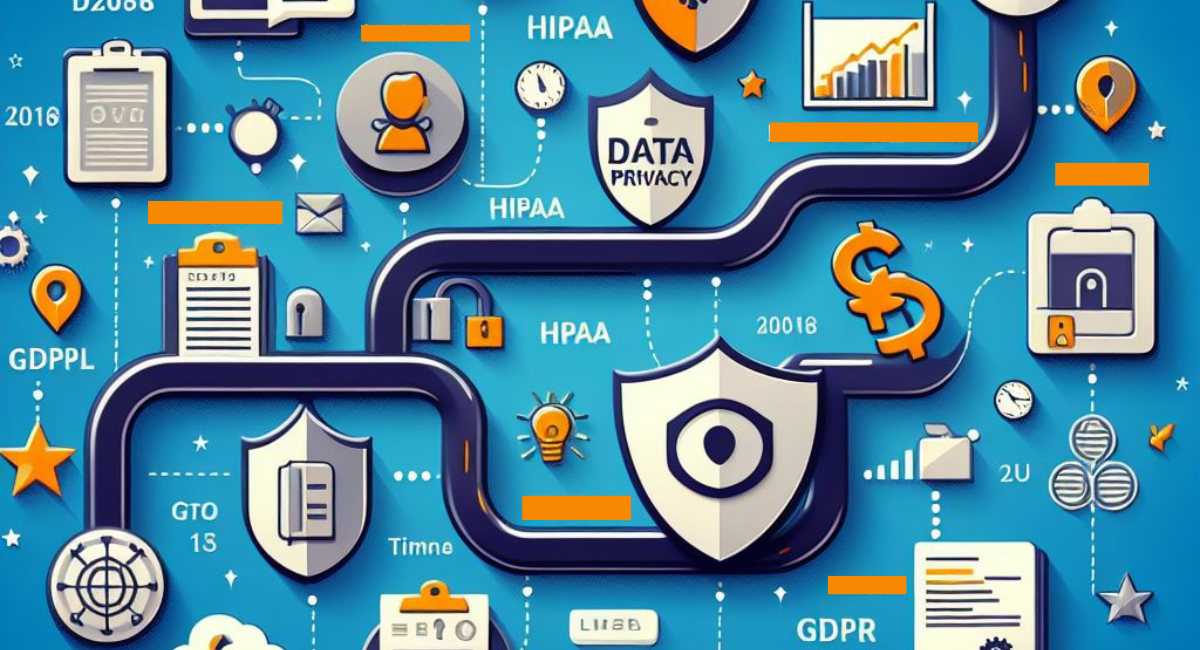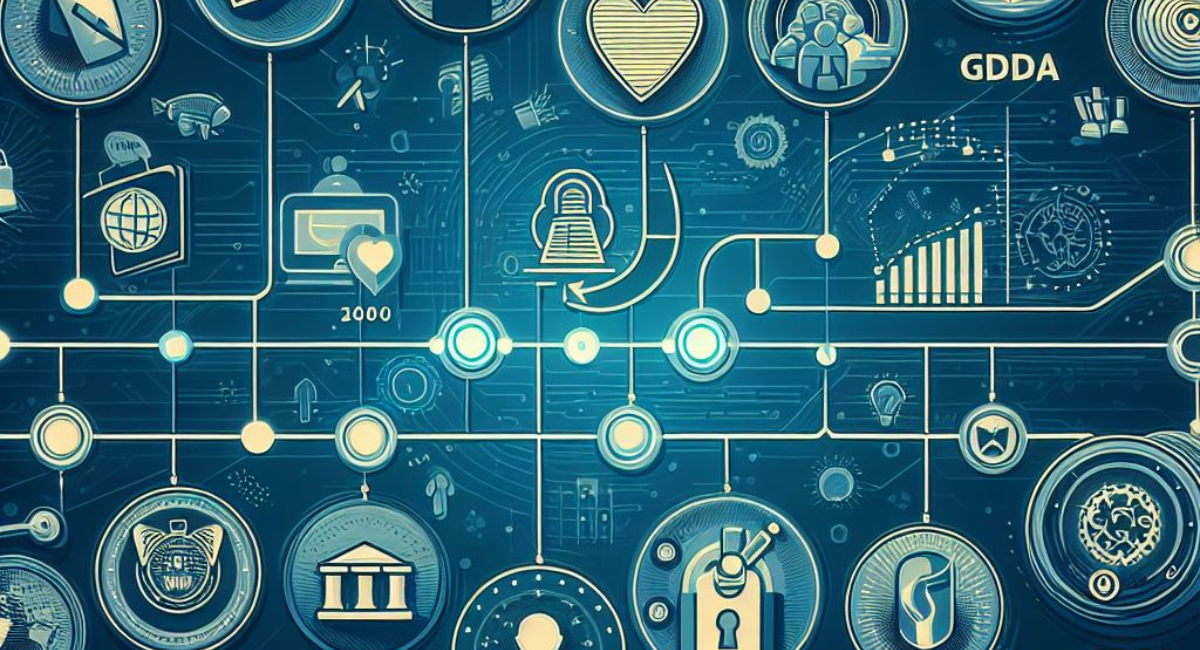Introduction
Definition Of Data Privacy

Data privacy refers to the protection of sensitive information that is collected, processed, and stored by an organization or individual. It encompasses various aspects, such as confidentiality, integrity, and availability of data. Confidentiality refers to limiting access to sensitive information only to authorized parties while integrity means ensuring that data is accurate and trustworthy. Availability refers to making sure that data is accessible when needed.
In the digital age, data privacy has become increasingly important due to the widespread use of technology and the internet. With more and more personal information being shared online, there is a higher risk of identity theft, cyberattacks, and other forms of digital crimes. Therefore, organizations must put in place measures to safeguard their customer’s personal data by implementing security protocols such as encryption.
Importance Of Data Privacy
Data privacy is important not only for protecting individual users but also for maintaining the trust between businesses and their customers. When people share their personal information with a company or organization, they expect that it will be handled responsibly and securely. Failure to protect this data can result in a loss of trust in the brand, which can ultimately harm its reputation.
Overview Of The Current State Of Data Privacy On The Internet
The current state of data privacy on the internet is a complex one. On one hand, there are regulations such as the European Union’s General Data Protection Regulation (GDPR) and California’s Consumer Privacy Act (CCPA) that aim to protect individuals’ personal data. However, on the other hand, there are also numerous instances of data breaches and companies mishandling user data.
One major concern is the widespread use of tracking cookies and third-party trackers that collect user data without their explicit consent. These trackers can be used for targeted advertising and even sold to third-party companies. Additionally, social media platforms have been criticized for their handling of user data, with scandals such as Cambridge Analytica bringing attention to how much personal information these companies possess.
While there have been some strides in protecting individuals’ personal information online, there is still much work to be done in terms of regulation and enforcement. It’s crucial for individuals to educate themselves on how their data is being collected and used online to ensure they’re making informed decisions about what information they’re sharing with companies.
The Evolution Of Data Privacy On The Internet
History Of Data Privacy On The Internet

In the early days of the internet, data privacy was not a major concern for most users. However, with the rise of social media and online advertising, concerns about data privacy have become increasingly important. In 1996, the US government passed the Health Insurance Portability and Accountability Act (HIPAA), which established rules for how healthcare providers must protect patient information. This law set a precedent for other industries to follow in protecting sensitive data.
In 2000, the EU adopted its Data Protection Directive to ensure that personal information could only be collected and processed with an individual’s consent. This directive paved the way for stronger data privacy regulations across Europe. In 2018, this legislation was updated with the General Data Protection Regulation (GDPR), which enforces strict guidelines on how companies must handle personal data.
Despite these regulatory efforts, many companies continue to collect and use personal data without individuals’ knowledge or consent. In response, several countries have established laws that allow consumers to take control of their own data by requiring companies to provide them with more transparency and control over their information. These include laws like California’s Consumer Privacy Act (CCPA) and Brazil’s General Data Protection Law (LGPD).
Technological Advancements That Have Impacted Data Privacy
One of the most significant technological advancements that have impacted data privacy is the widespread use of social media platforms. Social media platforms collect and store vast amounts of personal information, which can be used by third-party companies for ad targeting.
Another technological advancement that has impacted data privacy is the rise of IoT devices. The increasing number of connected devices in homes and workplaces means more personal data is being collected than ever before. These devices record information about everything from your daily routines to your location, which can put your privacy at risk if not adequately secured. Additionally, with the emergence of artificial intelligence (AI) and machine learning technologies, there are growing concerns about how these systems may impact individual privacy.
Data Collection and Storage
Types Of Data Collected Online
Personal information. This can include a person’s name, address, email address, and date of birth. Websites and apps collect this information to personalize user experiences and target advertising. However, this type of data can also be used for malicious purposes such as identity theft or phishing scams.
Browsing behavior. Websites use cookies to track users’ online activities such as the pages they visit, the links they click, and the time spent on each page. This information is often used by advertisers to create targeted ads based on a user’s interests and behaviors. While cookies are generally harmless, some users may prefer to disable them for privacy reasons.
Location data is another type of data collected online through GPS tracking on mobile devices or IP addresses on computers. This information can be used for geotargeted advertising or personalized content recommendations based on a user’s location.
Who Collects Data And How It Is Stored On The Internet?
There are several entities that collect data including websites, mobile applications, and advertisers. Online retailers also collect data when consumers make purchases or browse through their products.
Once the data has been collected, it is stored in various ways depending on the entity collecting it. Advertisers often store user data in cookies while retailers may store purchase histories on their servers. Websites often use third-party trackers such as Google Analytics to collect user information which is then stored on their servers. Mobile applications may use a combination of server-side storage as well as local storage within the device.
The Risks Associated With Data Collection And Storage

One major risk associated with data collection is the potential for cyber attacks. Cybercriminals are constantly seeking ways to exploit vulnerabilities in networks and databases to steal sensitive information such as credit card details or personal identification numbers. Once obtained, this information can be used for fraudulent activities like identity theft or financial fraud.
Moreover, data breaches can also occur due to human error or negligence. For instance, an employee might accidentally send sensitive information through an unsecured email account or misplace a hard drive containing confidential data. Such incidents can result in significant reputational damage for businesses while jeopardizing the privacy rights of millions of people whose personal information may have been compromised.
Data Breaches and Cybersecurity Threats
Definition Of Data Breaches And Cybersecurity Threats
Data breaches often occur as a result of cyber attacks that exploit vulnerabilities in computer systems and networks. Attackers may use various methods such as malware, phishing scams, and social engineering tactics to obtain access to valuable data.
Cybersecurity threats refer to any form of malicious activity that aims at compromising the security of digital devices and networks. These threats can take many forms including viruses, worms, Trojan horses, spyware, and ransomware among others. Cybercriminals use these tactics to gain access to sensitive information such as login credentials or bank account details which they can then use for fraudulent activities like identity theft or financial fraud.
The Impact Of Data Breaches On Data Privacy And Security
The impact of data breaches on data privacy and security is far-reaching. It affects not only individuals but also businesses and governments. Companies that experience data breaches face reputational damage and financial losses due to lawsuits filed by affected customers or clients. Governments also suffer from data breaches as they hold sensitive information about citizens that can be used for blackmail or other criminal activities.
The Role of Governments and Regulatory Bodies
Laws And Regulations Governing Data Privacy
Laws and regulations have been put in place to protect consumers from unauthorized access to their data. One such regulation is the General Data Protection Regulation (GDPR) in Europe, which requires companies to obtain explicit consent from users before collecting or storing their personal data.
In the United States, there are several laws governing data privacy including the Federal Trade Commission Act (FTC), which prohibits unfair or deceptive practices that may compromise consumer privacy. Additionally, the Health Insurance Portability and Accountability Act (HIPAA) protects medical records and other health-related information from unauthorized disclosure. (https://expo.aspe.org)
Other countries have similar laws such as the Personal Information Protection and Electronic Documents Act (PIPEDA) in Canada and the Privacy Act 1988 in Australia. These regulations aim to give individuals greater control over how their personal information is collected, used, and shared by organizations. Companies that fail to comply with these regulations can face significant fines or legal action.
Enforcement Of Data Privacy Laws
The enforcement of GDPR requires companies to obtain explicit consent from individuals before collecting their personal data, and they must also provide information about how that data will be used. Failure to comply with these regulations can result in fines of up to 4% of the company’s global revenue or €20 million, whichever is greater. This has forced many organizations to re-evaluate their data collection practices and implement more secure methods for protecting sensitive information.
Government Surveillance And Data Privacy
Government surveillance is a controversial topic as it raises questions on privacy rights and freedom of speech. The government has access to our personal data through various channels such as phone records, email metadata, and social media activity.
The issue of data privacy is especially crucial for individuals who hold sensitive information such as journalists or human rights activists. The possibility of their personal data being accessed by the government can lead to censorship and persecution. Additionally, the collection of personal information by governments poses security risks as hackers may target these databases.
Business and Consumer Data Privacy
Business Practices That Impact Consumer Data Privacy
Some common business practices that impact consumer data privacy include selling customer data to third parties without their knowledge or consent, failing to properly secure sensitive information from cyber threats such as hacking or malware attacks, and using tracking technologies like cookies and beacons to collect browsing history and other online activity. These practices can put consumers at risk for identity theft, financial fraud, and other malicious activities.
Responsibility Of Businesses To Protect Consumer Data
It is the responsibility of these businesses to protect this data from unauthorized access and use. This includes implementing strong security measures, such as encryption and firewalls, to prevent breaches.
Furthermore, companies must be transparent with their customers about how their data will be used and who will have access to it. They should also provide opt-out options for customers who do not wish for their data to be shared or used in certain ways.
In the event of a breach or misuse of consumer data, businesses should take immediate action to mitigate any harm caused and inform affected individuals. Failing to uphold these responsibilities can result in legal consequences and reputational damage for the business.
The Ethical Implications of Data Privacy
The Impact Of Data Privacy On Human Rights
The impact of data privacy on human rights cannot be overemphasized. When personal information is collected without consent or through dubious means, it undermines people’s autonomy and right to self-determination. It also exposes them to risks such as identity theft and financial fraud.
Moreover, the misuse of personal data can have severe consequences for people’s lives. For instance, individuals may lose access to job opportunities or social services if their profiles are negatively affected by inaccurate or misleading information obtained from their online activities.
The Ethics Of Data Collection And Use
Data collection can provide valuable insights and help companies offer personalized experiences to their customers. However, it also raises serious ethical questions about the use of personal information.
One of the main concerns with data collection is its potential for misuse or abuse. Companies may gather more information than necessary or use it for purposes that are not disclosed to users. This can result in breaches of privacy and even identity theft.
Another issue is the lack of transparency around how data is collected and used. Many users are unaware of just how much information is being gathered about them as they navigate the internet. And when companies do disclose their practices, legal jargon, and complex policies can make it difficult for users to fully understand what they’re agreeing to.
Conclusion
Data privacy on the internet is a complex and ever-evolving issue that requires attention and action from individuals, businesses, and governments alike. While there are laws in place to protect personal information, it is important for users to take their own precautions by being mindful of the websites they visit and the information they share online. Additionally, businesses must be transparent about how they collect and use customer data while also implementing secure measures to protect that data.
It is also crucial for governments to stay up-to-date with technological advancements and address any gaps in current policies or regulations. As individuals become more reliant on technology for everyday tasks, such as banking or healthcare management, the need for strong data privacy measures becomes even more pressing. By working together across industries and nations, we can create a safer online environment where personal information remains private and protected.
FAQs
What Are The Risks Associated With Data Collection And Storage?
One of the primary risks associated with data collection and storage is the possibility of a data breach. This can occur when an unauthorized party gains access to sensitive information stored by a company or organization. In many cases, these breaches are caused by cybercriminals who use sophisticated techniques to bypass security measures put in place to protect the data.
Another risk is the potential for misuse of collected data. Companies may collect data on their customers’ browsing habits, purchasing behavior, and personal information such as email addresses or phone numbers. This information can be sold or shared with third-party advertisers without users’ knowledge or consent, leading to targeted advertising that may not align with users’ preferences.
There is also a risk that collected data could be used for discriminatory purposes. For example, if an employer collects medical information from job applicants and uses it to discriminate against those with certain health conditions, it could lead to legal trouble and damage the company’s reputation.
How Can I Protect My Data Privacy Online?
To protect your data online, there are a few simple steps you can take. Be mindful of what you share on social media and other websites – avoid posting sensitive information like your address or date of birth publicly.
Use strong passwords and two-factor authentication wherever possible to secure your accounts. This will make it much harder for hackers to gain access to your personal information. Additionally, consider using a virtual private network (VPN) when browsing the web or conducting transactions online. A VPN encrypts your internet traffic and hides your IP address from prying eyes.
What Should I Do If I Suspect A Data Breach Has Occurred?
Check for any unusual activity on your bank statements or credit reports. Review any emails or messages that may have been sent out from your account without your knowledge. If there is evidence of a breach, immediately change all passwords associated with the compromised accounts.
Report the suspected breach to the relevant authorities. This may include contacting law enforcement agencies and filing a report with them, as well as notifying any organizations you believe may be affected by the breach.
Take steps to protect yourself against future breaches. Use strong passwords and two-factor authentication whenever possible. Be wary of phishing scams and suspicious emails from unknown sources. Keep all software up-to-date and install security patches as soon as they become available.
What Is The Future Of Data Privacy And How Can I Stay Informed?
The future of data privacy is uncertain. As technology continues to evolve, so do the methods that hackers use to steal personal information. It is important for individuals to stay informed on current trends in data security and take steps to protect their own privacy.
There are several ways you can stay informed about the latest developments in data privacy. You can subscribe to news outlets that cover cybersecurity issues or follow organizations dedicated to protecting consumer rights online. Additionally, regularly reviewing your own online habits and adjusting your privacy settings can go a long way in safeguarding your personal information from potential cyber threats.
